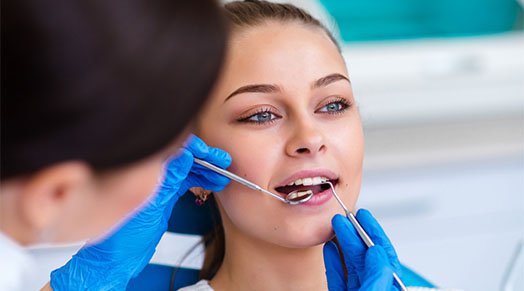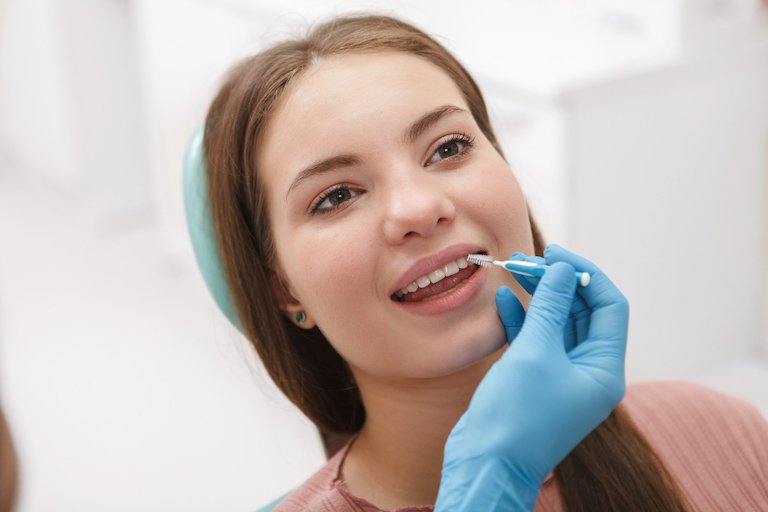Periodontal Care
PREVENTION AND TREATMENT OF PERIODONTAL DISEASES

Dr Anthony Franzmann
BDSc ( 1989- University of Melbourne)
MDSc (1998-Periodontology & Oral Biology-University of Melbourne)
Dr Anthony is a strong proponent of Preventive Dentistry.Over 30 years of clinical Experience across Australia, USA and UK.
Dr Anthony has significant interest in gum and bone health assessments and procedures.
Dr Anthony has improved the gum and bone health of several thousand clients over the last few decades. He firmly believes and practices evidence based periodontal work and keeps up with latest developments in the field of Oral Biology.
DENTISTRY SKILLS
- Scale and root planing
- Connected Tissue grafts (CTG)
- Free Gingival Graft
- Bone grafting
- Guided Tissue Regeneration
- Crown Lengthening
- Oral/Salivary Diagnostics
- Complex Oral conditions assessments
- Oral Surgery
- Invisalign
Periodontal Care Melbourne CBD
Gums are an important part of oral health. The supportive structures around the actual teeth hold the teeth in position and form the foundation for good oral health.

Our mouths are home to bacteria. These bacteria mucous and other particles constantly form a sticky, colourless “plaque” on teeth.
Brushing and flossing help remove plaque.
Unremoved plaque can harden and form “tartar” that brushing doesn’t clean.
Only a professional cleaning by your dentist or dental hygienist can remove tartar.
Gingivitis
The longer plaque and tartar remain unremoved, the more harmful they become. Gingivitis is an inflammation of the gums that bacteria can bring on.
With gingivitis, your gums become red and swollen and can bleed easily.
When treated properly by a dentist or dental hygienist, gingivitis may be reversed with consistent brushing, flossing, and cleanings.
This periodontal disease does not include bone loss and tissue that holds teeth in place.

Periodontitis
When gingivitis is left ignored, it can advance to periodontitis.
In periodontitis, the gums recede from the teeth and form infected pockets.
The body’s immune system fights off bacteria as plaque spreads and grows below the gumline. Bacterial toxins and the body’s natural reaction to infection cause the bone and connective tissues that hold teeth in place to start to deteriorate.
If left untreated, the bones, gums, and tissue that support the teeth are affected.
Risk Factors
- Smoking
- Hormonal changes in girls/women
- Other illnesses medicines. Numerous prescription and over-the-counter medicines are available; however, some might lead to an abnormal overgrowth of gum tissue, making maintaining clean teeth and gums challenging.
- Genetic susceptibility

Who gets gum disease?
Gum disease often is not noticed until a person is between the ages of 30 and 40. Gum disease is more common in men than in women.
Teenagers are less likely to get periodontitis, but they can get gingivitis, a less severe form of gum disease.
Gum diseases usually develop when plaque builds up along and under the gumline.

How do I know if I have gum disease?
The symptoms of gum (periodontal) disease include:
- Bad breath that doesn’t seem to go away
- Red or swollen gums
- Tender or bleeding gums
- Painful chewing
- Loosened teeth
- Receding gums or longer appearing teeth
Treatment for Gum Disease
Infection control is the primary objective of gum disease treatment. The quantity and kind of treatments will change based on how severe the gum disease is.
Any treatment requires that the patient maintain good oral hygiene at home. Your Melbourne CBD dentist may also suggest changing certain behaviours, such as quitting smoking, to improve treatment outcomes.

Deep Cleaning (Scaling and Root Planing)
Dental hygienists and dentists employ scaling and root planing as deep cleaning methods to remove plaque.
Scraping out tartar from under and above the gum line is known as scaling.
Root planing smooths out the rough areas on the tooth root where bacteria like to gather, helping to eliminate disease-causing bacteria.
Plaque and tartar can occasionally be removed with a laser. This approach may result in less bleeding, swelling, and discomfort than conventional deep cleaning techniques.
Surgical Treatments
Flap Surgery
Surgery can be required if deep pockets and inflammation don’t go away despite deep cleaning and medicine.
A dentist may perform flap surgery to remove tartar deposits from deep pockets, minimising the periodontal pocket and simplifying the area’s maintenance for the patient, dentist, and hygienist.
In this routine procedure, the tartar is removed, and the gums are lifted back. Then, the gums are sutured back to allow the tissue to encircle the tooth securely.
After surgery, the gums heal and fit more tightly around the tooth, sometimes resulting in the teeth appearing longer.
Bone and Tissue Grafts
Your dentist may recommend procedures to help rebuild any lost gum tissue or bone due to periodontitis in addition to flap surgery.
Bone grafting can promote bone growth by implanting synthetic or natural bone in the area where bone is missing. Guided tissue regeneration is one procedure that can be used with bone grafting.
A tiny mesh-like substance is placed between the gum tissue and the bone during this treatment.
This permits the regeneration of connective tissue and bone by preventing gum tissue encroaching on the bone’s proper location.
Growth factors are proteins that your body can naturally use to repair bone.
Your Melbourne CBD dentist may suggest a soft tissue graft if the gum tissues have been removed. This procedure covers the exposed tooth roots with artificial material or tissue from another part of your mouth.
It is impossible to say which grafts will succeed in the long run because every situation is unique.
The degree to which the disease has advanced, the patient’s level of oral hygiene, and specific risk factors, like smoking, which may reduce the chance of success, are just a few of the variables that may affect the treatment results.
Ask your Melbourne CBD dentist what the level of success might be in your case.

Preventive Measures
- Keep Your Mouth Clean: Floss every day and brush your teeth at least two times a day to remove food particles and plaque.
- Watch Your Diet: Make sure your diet is well-balanced and rich in whole grains, fruits, and vegetables. Limit sugar-filled beverages and snacks.
- Say No to Tobacco: Avoid smoking or using tobacco products, as they can harm your gums and make gum disease worse.
- Visit Your Dentist Regularly: Visit your Melbourne CBD dentist every six months for a check-up and professional cleaning. These visits help catch any gum issues early and keep your mouth healthy.
Monitoring and Maintenance
- Dental Check-ups: During your dental visits, your dentist will check the health of your gums, measure any gum recession, and look for signs of gum disease.
- X-rays: Sometimes, X-rays are needed to see if there’s any bone loss around your teeth, which can be a sign of gum disease.
- Personalised Treatment: If gum problems are found, your Melbourne CBD dentist will create a treatment plan based on your needs.
- Keep Up Good Habits: Stick to your daily brushing and flossing routine at home to keep your gums healthy between dental visits.
- Follow Your Dentist’s Advice: Attend any follow-up appointments your dentist recommends to ensure your gums heal well and prevent future problems.
By following these easy tips, you can take good care of your gums and maintain the health of your smile for years!
Periodontal Care in Melbourne CBD
Periodontitis can be stopped if detected and treated early enough. Treatment is typically very successful.
Dr Anthony Franzmann will work closely with you to find the perfect treatment option for you.
Periodontal Care – Competitively priced and without long waited periods!
Call us on (03) 9642 8955 or request an appointment online.
We are located at Level 17, 190 Queen Street in Melbourne CBD.
Frequently Asked Questions
How do I maintain the health of my gums and teeth?
- Use a fluoride-containing toothpaste and a soft-bristled toothbrush to clean your teeth twice a day.
- To remove plaque from difficult-to-reach spaces between your teeth, floss daily.
- Visit your Melbourne CBD dentist routinely for a dental check-up and professional cleaning.
- Don’t smoke. If you do, try stopping.
Can gum disease result in health issues beyond the mouth?
There may be other causes for people with gum disease to develop additional health problems.
For example, something else may cause gum disease and another condition, or it could be a coincidence that you suffer from gum disease and other health problems.
More research is needed to explain whether gum diseases cause health problems beyond the mouth and whether treating gum disease can keep you from other health conditions.
In the meantime, it’s known that preventing gum disease can save teeth—a good reason to take care of your oral health.
What are the signs of periodontal disease?
Signs include swollen, bleeding gums, bad breath, receding gums, loose teeth, and changes in bite.
How is periodontal disease treated?
Treatments vary but may include professional cleanings, scaling and root planing, medicines, laser therapy, or surgery.
How often should I visit the dentist for periodontal care?
Most people should visit the dentist every six months, but those with gum disease may need more frequent visits.
Can periodontal disease be cured?
While not cured, gum disease can be managed with proper treatment and maintenance, preventing further damage to gums and teeth.
Can gum disease affect children and teens?
Yes, while less common, children and teens can develop gum disease because of poor dental hygiene or genetic factors.
Can I reverse gum disease at home?
While proper oral hygiene can help manage gingivitis, advanced periodontal disease typically requires professional treatment.
Will my dental insurance cover periodontal treatment?
Different coverage may apply depending on your insurance plan and the required treatment. It’s best to check with your provider for details.
Can I still get periodontal disease if I brush and floss regularly?
While good oral hygiene lowers the risk, genetics and systemic health issues can still predispose you to gum disease.
Can I prevent gum disease if I've already had it in the past?
Yes, you can manage gum disease and prevent recurrence with proper ongoing care and regular dental check-ups.
